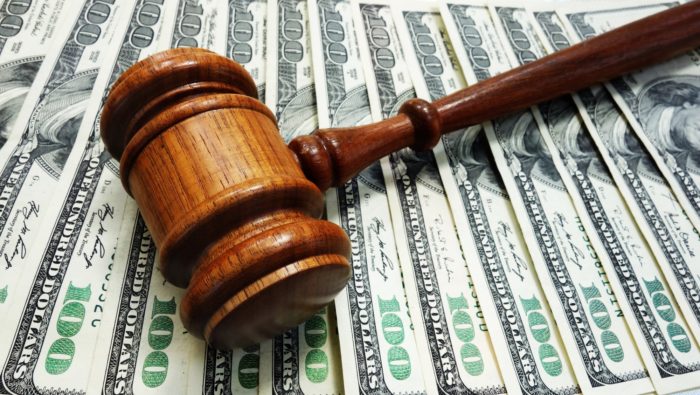Top Class Actions’s website and social media posts use affiliate links. If you make a purchase using such links, we may receive a commission, but it will not result in any additional charges to you. Please review our Affiliate Link Disclosure for more information.

Approximately 4.5 billion records worldwide were compromised in data breaches in the first half of 2018 alone, up a staggering 133 percent compared to the same period in 2017, according to digital security firm Gemalto.
Data Privacy Day, Jan. 28, Highlights Issues in Cybersecurity and Data Protection for Consumers. Here’s why you should care.
If you own a computer, smartphone, credit card or debit card, chances are your data was stolen in a recent data breach.
In just the first six months of last year, more than 25 million records (including medical, credit card and/or financial data or personally identifiable information) were compromised or exposed in data breaches every day — that’s 291 records every second, according to digital security firm Gemalto.
The reason? The sheer number of people connected to a technology device at any given time means more opportunity for hackers to steal their information.
With more people relying on technology throughout the day, cybersecurity issues have far-reaching implications in just about every industry, including healthcare, social media, retail, and more.
Data Privacy Day Raises Awareness on January 28
The National Cyber Security Alliance hosts Data Privacy Day each January 28 in commemoration of the 1981 signing of Convention 108, the first international treaty addressing data protection.
This day serves as an important reminder of what steps can be taken by businesses and individuals with respect to better security in an increasingly interconnected world. It’s an opportunity to carve out some time to see if you’ve been named in a data breach and to take steps to protect your identity going forward. Being aware is a vital component for consumers who have personal information stored in many places online.
Who’s Responsible in Data Breaches?
No longer are identity thieves and hackers targeting major companies; businesses of all sizes are exposed to the risk of a hack and resulting data breach. While companies try to play catch-up in establishing protocols that lower their risk and protect consumers, consumers also must become educated about the dangers. Taking a proactive approach to protecting your own data will minimize the risk, but the possibility of a data breach still exists for everyone.
With data breaches now affecting so many millions per year, data breach lawsuits have begun to raise the question of what responsibility companies have for proactive policies designed to discourage hacks. More than 90 percent of consumers said they currently object to how their data is being used or shared by third-party vendors in a Blue Fountain Media study.
From fast food diners who filed an Arby’s data breach lawsuit and Sonic data breach lawsuit after they were exposed to identity theft simply from swiping their card at the restaurants, to people who thought they were protecting themselves by monitoring their credit scores only to learn their details were leaked in an Experian data breach, consumers want answers and more protection.
The Changing Legal Landscape of Data Privacy
Hacks are becoming more common because of the speed at which technology advances today. Many people have multiple entry points for their personal data, such as tablets, phones, and computers. Each one is an opportunity for a hacker.
More than one million malicious software programs are created every single day, according to a CNN report, making it hard to figure out what to do to guard against every individual threat. With many companies struggling to figure out how to pre-empt these threats in a constantly-evolving landscape, consumers continue to be at risk.
What Can Hackers Do with Information Revealed in a Recent Data Breach?
A hacker who accesses the personal details of a consumer through a recent data breach could:
- Withdraw funds from bank accounts
- Send communication on your behalf
- Sign up for utility services
- Get new credit cards in your name and run up debt
- Impact your tax return filings
- Lock you out of your financial or social media accounts
- Destroy your credit score
All too often, a data breach victim learns about this after his or her identity has already been stolen.
Top 5 U.S. Data Breaches in 2018 Worth Monitoring Your Credit For
Increasingly, consumers are calling on companies with demands to heighten security protocol so that hackers are less likely to try or achieve success with accessing personally identifying information. Despite these requests and rising legislator interest in data security, some consumers believe it’s too little, too late. And for many of them, it is.
Millions of people were affected by 2018 data breaches. The top five hacks affecting the most people that year included:
1. MyHeritage Data Breach. More than 92 million people who used DNA ancestry company MyHeritage had their passwords and email addresses leaked based on reports that came out in June. The hack led to a MyHeritage data breach class action lawsuit.
2. Quora Data Breach. Unauthorized access to the profiles, email addresses, and passwords of 100 million people who used question-and-answer website Quora was noted in December.
3. Under Armour Data Breach. Leaked account details of 150 million MyFitnessPal users in February led to an Under Armour class action lawsuit.
4. Exactis Data Breach. More than 400 categories of personally identifying information was posted on a public site by the marketing firm Exactis that impacted 110 million businesses and 230 million consumers. An Exactis data breach class action lawsuit was filed soon after.
5. Marriott Data Breach. Over 500 million people who stayed at hotels like Marriott properties had their passport numbers, birth dates, travel info, and credit card numbers shared in a Starwood data breach that broke in September, but could have begun in 2014. A Marriott data breach class action lawsuit is currently pending.
Protecting Your Info From a Possible Data Breach
If you use a computer, credit card, or debit card, there’s no way to completely protect yourself from a data breach. However, a few steps can help you guard against the risks of having your personal details stolen, sold, or used by a hacker.
Take your information security into your hands with these tips:
- Create complicated passwords, change them often, and use different passwords for each of your different accounts.
- Use a credit card for shopping, since the risk of fraudulent charges is lower. Some debit card companies are even charging fees to consumers after a hack, according to news reports.
- Respond to any notices you receive about a data breach immediately to determine when it happened, what was compromised, and what to do next.
- Set up account alerts so that you know as soon as possible if your details have been leaked or breached
How to Tell Whether You’re a Victim of a Recent Data Breach
Plenty of victims learn about the possibility of a hack from the news or when they are contacted directly by the company that went through the breach. Consumers can also do online searches at trusted websites to determine whether or not they’ve been compromised.
Three recommended websites include:
- Have I Been Pwned?
- Has My Email Been Hacked?
- Breach Alarm Password Hacking
Steps to Take After Discovering Your Information Leaked in a Data Breach
Did you know that one out of three people who is named in a data breach will also become a victim of identity theft, according to Javelin Strategy & Research?
How you respond to a suspected or confirmed breach could protect you from suffering any further. If free monitoring or fraud alerts are offered by the company that experienced the data breach, take advantage of them. Users of the Experian data breach, for example, can enter their information here: https://www.experian.com/fraud/center.html
If you’ve been named in a data breach, take the following steps to protect yourself:
- Change all your passwords.
- Contact all the credit bureaus.
- Consider asking credit bureaus to “freeze” your credit for a certain period of time.
- Sign up for fraud alerts with all your financial accounts and monitor them more closely.
- Consider canceling your current credit or debit cards and obtaining new ones.
- Sign up for identity monitoring.
If your identity has been stolen, take the extra step of filing a formal government report about it. Visit https://www.ftccomplaintassistant.gov/ to get started. Going through that process will help you with legal grounds should you need to dispute any instances of fraud.
Follow Top Class Actions to Learn About Data Breach Class Action Lawsuits and Settlements
Top Class Actions lets our viewers know about every data breach class action settlement affecting them. We provide a detailed breakdown of the settlement benefits, including cash or free credit monitoring available, and how to file a timely claim.
Data breach class action settlements still currently accepting claims are:
- Wendy’s data breach class action settlement (Deadline 3/21/19)
- Experian data breach class action settlement (Deadline 4/11/19)
- Sonic data breach class action settlement (Deadline 4/19/19)
- Zippy’s restaurant data breach settlement (Deadline 6/2/19)
- Arby’s data breach class action settlement (Deadline 7/13/19)
- Anthem data breach class action settlement (Deadline 8/16/19)
- Manatee County School District data breach settlement (Deadline 10/18/19)
- TransPerfect Employee data breach settlement (Deadline 2/10/21)
Even if your data wasn’t leaked in the one of the recent data breaches, you owe it to yourself to remain aware about data privacy issues. Continue to check our website for the latest news on data breaches and be sure to sign up for our FREE weekly newsletter to have updates on class action settlements delivered to your inbox .
ATTORNEY ADVERTISING
Top Class Actions is a Proud Member of the American Bar Association
LEGAL INFORMATION IS NOT LEGAL ADVICE
Top Class Actions Legal Statement
©2008 – 2024 Top Class Actions® LLC
Various Trademarks held by their respective owners
This website is not intended for viewing or usage by European Union citizens.


















311 thoughts onRecent Data Breach Trends Mean Your Info Was Likely Stolen Last Year
I just received an email that my data was breached listing 22 different companies. I also have had my tax refund held until I proved my identify due similar breaches. Please help on how to proceed with protecting my identity.
Why aren’t you going after Quora? It wouldn’t even let me delete my account it took me seven tries and a nasty email to them